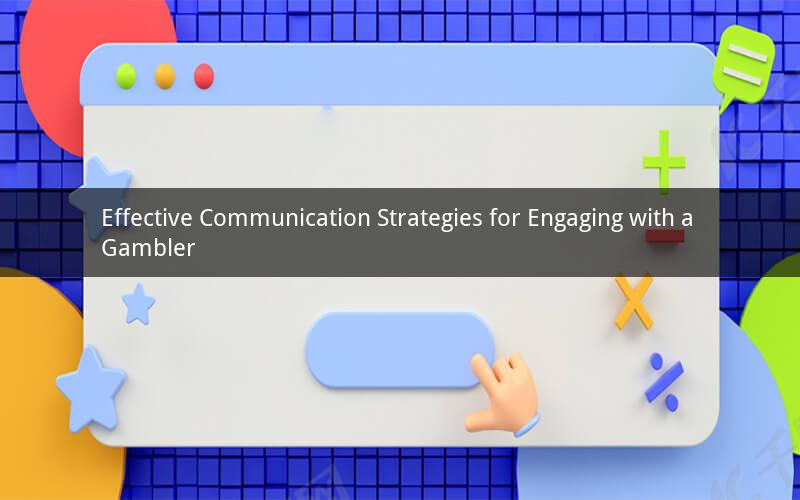
When it comes to addressing someone who has a gambling problem, it's essential to understand the importance of communication. Finding the right words to say can make a significant difference in their journey towards recovery. This article explores various effective communication strategies for engaging with a gambler, along with five frequently asked questions and their respective answers.
1. Understanding the Situation
Before diving into the conversation, it's crucial to have a clear understanding of the gambling problem. Recognize that gambling addiction is a complex issue, and it affects not only the gambler but also their loved ones. By acknowledging the severity of the situation, you can approach the conversation with empathy and support.
1.1 Recognize the Signs of Gambling Addiction
To engage effectively with a gambler, you need to be aware of the signs and symptoms of gambling addiction. These may include:
- Preoccupation with gambling, even when it's not happening
- Increased time spent on gambling activities
- Borrowing money to finance gambling
- Feeling remorseful after gambling
- Continuing to gamble despite negative consequences
1.2 Acknowledge the Power of Empathy
Empathy plays a vital role in helping a gambler. By showing understanding and compassion, you can create a safe and supportive environment for them to open up.
2. Open Communication
Once you've gained an understanding of the situation, it's time to initiate a conversation. Here are some effective communication strategies:
2.1 Approach the Conversation with Care
When you approach the topic of gambling addiction, do so with care and sensitivity. Choose a private and quiet setting to ensure that the person feels comfortable and safe during the conversation.
2.2 Listen Actively
Listening actively is crucial in any conversation, especially when addressing a gambling problem. Pay close attention to what the gambler is saying, and avoid interrupting. This will help them feel heard and respected.
2.3 Use "I" Statements
When discussing the impact of gambling on yourself or others, use "I" statements to express your feelings without placing blame. For example, instead of saying, "You always gamble and leave me with no money," say, "I feel worried when I see you gambling because it affects our finances."
2.4 Ask Open-Ended Questions
Encourage the gambler to share their thoughts and feelings by asking open-ended questions. This will help them explore their addiction and the underlying issues contributing to it. For example, you can ask, "How do you feel when you're gambling?"
3. Encourage Professional Help
While communication is essential, it's also crucial to encourage the gambler to seek professional help. Here are some strategies for doing so:
3.1 Research Treatment Options
Help the gambler research various treatment options, such as counseling, support groups, or rehabilitation centers. By providing them with information, you can empower them to make an informed decision.
3.2 Offer to Accompany Them
Offer to accompany the gambler to their first appointment or support group meeting. This shows your commitment to their recovery journey and can help ease their anxiety.
3.3 Be Patient
Recovery is a process that takes time. Be patient and understanding as the gambler navigates through their treatment and recovery.
4. Support and Encouragement
Once the gambler has started their recovery journey, it's essential to provide ongoing support and encouragement. Here are some ways to do so:
4.1 Celebrate Small Wins
Recovery is often a series of small victories. Celebrate these milestones with the gambler to help them stay motivated.
4.2 Encourage Participation in Support Groups
Support groups can provide a valuable source of support and guidance for individuals struggling with gambling addiction. Encourage the gambler to participate in these groups to connect with others who understand their struggles.
4.3 Continue to Communicate
Maintain open lines of communication with the gambler throughout their recovery journey. This will help them feel supported and remind them that you're there for them.
5. Frequently Asked Questions
Q: How do I know if someone is a problem gambler?
A: Look for signs such as preoccupation with gambling, increased time spent on gambling activities, borrowing money to finance gambling, feeling remorseful after gambling, and continuing to gamble despite negative consequences.
Q: Can I confront a problem gambler about their addiction?
A: Yes, you can confront a problem gambler about their addiction, but it's important to approach the conversation with care and sensitivity. Use "I" statements to express your concerns without placing blame.
Q: How can I support a loved one who is struggling with gambling addiction?
A: You can support a loved one by understanding the situation, engaging in open communication, encouraging them to seek professional help, and providing ongoing support and encouragement throughout their recovery journey.
Q: Can gambling addiction be cured?
A: While there is no cure for gambling addiction, it can be effectively managed through treatment and support. Recovery is a lifelong journey, and individuals can learn to cope with their addiction and lead fulfilling lives.
Q: What if my loved one refuses to seek help?
A: It can be challenging when a loved one refuses to seek help. In this situation, continue to offer support and show empathy. However, remember that you cannot force someone to change. Focus on taking care of yourself and seek support for yourself as well.
In conclusion, effective communication is key when engaging with a gambler. By understanding the situation, approaching the conversation with care, encouraging professional help, and providing ongoing support, you can help your loved one on their journey towards recovery. Remember to be patient, empathetic, and proactive in your efforts to support them.